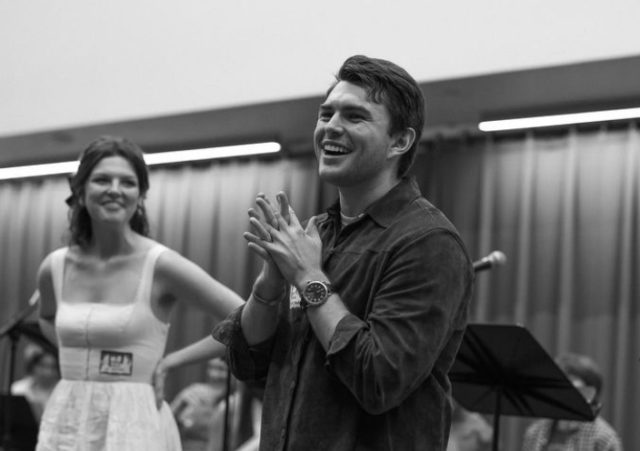This post was updated Nov. 28 at 7:30 p.m.
In the musical “Like Father,” alumnus Caroline Pernick and her creative partner Jacob Ryan Smith harmoniously blend coming-of-age themes with true crime.
Earlier this year, the up-and-coming horror dramedy “Like Father,” won the inaugural Open Jar Shark Tank and was a finalist for the Eugene O’Neill New Music Theater Festival. The musical – which is currently in development – follows Chris, a girl whose father is convicted as a serial killer as she enters her senior year of high school. After moving in with her mother and stepfather with whom she has no previous relationship, Chris must navigate her new environment and establish herself as separate from her father. However, Pernick said viewers don’t actually learn about Chris’s father’s conviction until later in the show. According to her, this was an intentional plot decision that she and Smith made.
“The focus (of the musical) is first and foremost supposed to be a coming-of-age story,” Pernick said. “It’s not supposed to be about the crime committed. It’s more like an extreme look at how we as kids start to realize our parents aren’t perfect.”
[Related: UCLA alumnus Erin Dubreuil brings talent, passion to musical theater]
“Like Father,” comments on the sensationalism linked to true crime through an exploration of how the victims and family members of convicted murderers cope with the aftermath of the crime, Pernick said. The musical is also an examination of the American public’s obsession with true crime, she added, which is where the comedy aspect comes in.
The musical even features its own fictional true crime podcast called “Bloody Good” that Pernick said the characters of Chris and her friend Trevor frequently listen to. “Bloody Good” is also one of the main song titles and the first composition Pernick and Smith wrote together for the musical, Smith said. The number aligns with the musical’s main goal of reflecting on society’s infatuation with crime, he added.
“‘Bloody Good’ is this very funny satirical song about our two 16-year-old protagonists singing about their favorite murders from listening to them on podcasts,” Smith said. “There’s this insensitivity in the way that they’re talking about (the crimes), which is sort of how we – as a society obsessed with violence and trauma – find ourselves talking about true crime a lot.”
In creating the production, Pernick said she and Smith sought to focus on who true crime leaves out of the story. They also hoped to examine how it might be different to see these stories as entertainment versus looking at the actual people who are being affected by the crimes. These questions were central to the team’s early storyboard planning, she said.
The project was initiated by Smith, who said he was inspired by an interview he watched that features the daughter of American serial killer John Wayne Gacy. Smith said he conceptualized a story based on the experience of someone whose family member had committed acts of unjustifiable cruelty. Shortly after, he recruited Pernick to work on the musical numbers and help flesh out the main character’s perspective as a teen girl, he said.
“I wanted to bring somebody on board that could help (the musical) feel a lot more authentic and could fill in the holes that I’m not going to be able to do myself for this story,” Smith said. “Caroline is one of the best singer-songwriters I’ve ever met personally and I’ve ever heard in general. … It felt obvious that she’d be able to provide that more authentic sound and that authenticity to the storytelling.”
Pernick said she later introduced fellow UCLA alumnus Karima Karkori to serve as the project’s assistant director. According to Karkori, one of the team’s main challenges was working with over 20 songs. With so much content to manage, Karkori said she and director Megumi Nakamura were tasked with scheduling rehearsals in a way that would cater to each actor’s needs while also focusing on bringing the whole production together.
In addition to the music and the cast, another highlight of the production is its creative team’s diversity, Karkori added. It was important to Pernick and Smith that the musical’s characters and storylines would accurately represent the identities and backgrounds the team hoped to portray, Karkori said.
“I really enjoyed that the team we put together ended up being a super diverse team in terms of identities,” Karkori said. “Me and Megumi were really happy to bring our different perspectives because of our different identities. … Getting to bring our different perspectives as queer people, as women of color – it was really awesome getting to have that extra layer.”
[Related: ‘The Allure of Thug Life’: Alumnus Mélia Mills talks creative process, backstory]
With a dedicated cast and crew working on the production, Pernick said she and Smith are optimistic about the musical’s future. Though the production is still in the works, Smith said the writers are confident that the musical will hit the stage. After finishing the script in one year, Pernick and Smith are already on track with production discussions in full swing, Pernick said.
“(Like Father,) is a really genuine piece that comes from a true fascination with the subject material, and it feels like a necessary thing to write rather than something that we’re trying to put all of our apples into as something profitable,” Smith said. “Now, do I believe that it can run the gamut and go to Broadway and live the full life? Of course. I would love for audiences to get to see it and for us to find that perfect line where this is consumable by a lot of different kinds of people.”






Comments are closed.